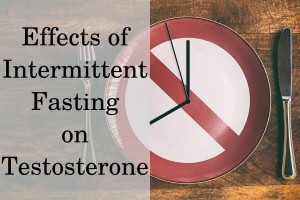In this article
If you have ever tested your testosterone levels, then you may already know that being in a fasted state is one of the requirements for getting accurate results.
That’s because researchers have found that eating a meal can influence your T levels and suppress its natural peak which normally occurs in the morning, although the exact mechanism is still unclear.
Yet, this has led to speculations that fasting for longer periods of time may prolong the morning peak of testosterone levels or even increase T levels further in healthy individuals.
Unfortunately, this appears to not be the case as most studies report either no change or even a decrease in T levels in healthy men after prolonged fasting.
What is more, men with low T due to medical conditions affecting the testes will not benefit from fasting, nor from any other method for boosting their T levels naturally.
If you have low T and symptoms, you may need medical consultation and hormonal treatment to manage your complaints and restore the quality of your life.
How does fasting affect testosterone?
Fasting is a dietary intervention that people often try out in an attempt to lose weight and improve their health. The most common types of fasting include:
- Intermittent fasting
- Prolonged water fasting
- Prolonged dry fasting
Intermittent fasting is the most popular diet that involves short periods of fasting, usually ranging from 16 to 36 hours or rarely more. The fasting periods can also involve dry or water fasting depending on whether the intake of calorie-free drinks such as water is allowed.
Currently, studies investigating the effects of intermittent fasting on T levels are scarce and the evidence is mostly mixed.
For example, a trial conducted on 45 men celebrating Ramadan, who were fasting intermittently during the daytime and eating at night before going to bed, reported a decrease in serum follicle-stimulating hormone (FSH) levels and no changes in testosterone levels.
FSH is one of the hormones produced by the pituitary that stimulates T synthesis
What is more, studies investigating the effects of long periods of water fasting on T levels show largely negative results. A trial involving fasting for 56 hours reports that T levels dropped by 34% on average at the end of the period. Three and a half days of fasting in another study led to a more than 40% decrease in T levels.
Considering the discrepancy of the research, most gurus who promote intermittent fasting as a way to boost natural testosterone levels use studies on the correlation between androgens and food intake instead, as indirect evidence that fasting should improve testosterone.
Indeed, most studies show that breaking the overnight fast and consuming a meal in the morning decreases testosterone levels for up to several hours. Normally, testosterone levels have diurnal fluctuations, and they reach a peak in the morning, prior to breakfast.
Trials also suggest that high-fat meals appear to have the strongest suppressive effect, although the exact mechanisms for it remain unknown.
However, more recent research also reports that the difference between fasting and non-fasting T levels appears insignificant, especially in older men.
Either way, the benefits of fasting on T levels appear to affect mostly the morning T peak, while the mean testosterone levels throughout the day tend to remain the same regardless.
Read next: How Vasectomy Affects Testosterone Levels
Fasting affects the production of testosterone through the luteinizing hormone
Apart from testosterone, fasting also appears to affect the hormones produced by the pituitary gland, which also stimulate testicular function and T synthesis. They are FSH and luteinizing hormone (LH).
Yet, the evidence on the exact relationship between fasting and LH levels is mixed. The previously mentioned study shows that fasting for 56 hours decreases LH levels, while another 10-day fasting trial reported no significant changes.
One study found that 3.5 days of fasting reduces the number of daily peaks of LH hormone, but increases their amplitude. Thus, the total amount of LH synthesized for 24 hours remained the same.
Normally, LH stimulates the production of testosterone in the testes, while T acts as feedback for LH synthesis. As testosterone levels increase, LH levels are suppressed and vice-versa.
Therefore, high LH during a test may actually be a signal that the testicles are not producing enough testosterone and low T levels are sending feedback to the pituitary gland to produce more gonadotropic hormones.
Studies report that LH directly stimulates the production of testosterone in the Leydig cells, alongside other androgens. It does so by upregulating the uptake of cholesterol by the Leydig cells, which is the basis for T synthesis.
Fasting helps natural T production by reducing body weight
Intermittent fasting is just one of the dietary approaches people may use to shed extra fat. Its popularity stems from the fact that it restricts the time you have to eat, rather than the food options you have, which at least in theory makes it possible to enjoy your favorite meals while losing weight.
Intermittent fasting can involve daily time-restricted feeding, several 24h fasts during the week, or fasting for 24 hours every other day (alternate-day fasting) depending on the regime.
Daily time-restricted feeding involves daily fasts which last anywhere between 16 and 22 hours. The regime 16/8 is the most popular one because it is the least restrictive and easiest to follow. More restrictive regimes such as 22/2 are also known as the Warrior Diet and OMAD (one meal a day).
Researchers have shown that even less-restrictive variations such as 16/8 can be effective and result in weight loss in both the short-term and the long term.
Losing weight can help patients improve their cardiovascular and metabolic health
Yet, intermittent fasting does not appear more effective than other methods for weight loss. The impact of intermittent fasting on weight loss is the same as other weight-loss diets when their calories match.
It still depends on the size of your caloric deficit to determine what results you will see from intermittent fasting.
Losing weight can also help increase the natural T levels in men who are obese. Studies report that overweight and obese men usually have lower levels of total testosterone, while their levels of free T remain unchanged. However, patients with severe obesity may also experience a decrease in free T levels.
Thus, the correlation between weight loss and T levels is not linear. Losing even small amounts of weight can be beneficial for your T levels as well as your overall health, especially if you were severely obese.
Does fasting reduce the inflammation that lowers T levels?
Several studies have shown that individuals who follow intermittent fasting diets such as daily time-restricted feeding or alternate-day fasting experience reduced levels of proinflammatory cytokines.
The researchers reported that these benefits occurred as soon as the 3rd week of fasting, including in healthy individuals. Longer periods of fasting such as 8-weeks of alternate-day fasting also resulted in decreased levels of TNF-alpha and oxidative stress.
However, it is important to note that changes in body fat percentage are also strongly associated with inflammation. Studies highlight that even in healthy non-obese individuals, losing body fat also lowers the same markers for inflammation.
Thus, any weight loss diet that is effective in reducing body fat may potentially lead to the same benefits against inflammation.
With that being said, scientists report that there is evidence linking intermittent fasting to reduced inflammation and symptom severity in men with different forms of arthritis such as rheumatoid arthritis (RA), psoriatic arthritis, and osteoarthritis.
Unfortunately, the scientists point out that the symptoms often flare up after the fasting window ends and food is reintroduced.
Focusing on weight loss instead appears to be the more effective approach for the long-term management of symptoms such as pain and inflammation.
The researchers also reported on fasting and its benefits for other autoimmune diseases besides RA such as multiple sclerosis, and type 1 diabetes. However, there is not enough research to recommend intermittent fasting as a dietary approach in these conditions.
Factors that increase inflammation such as obesity or exposure to toxins may lower T levels. However, inflammation does not necessarily lead to clinically manifested testosterone deficiency, unless the inflammatory process also affects the testes.
How to fast for the highest T levels
Considering the evidence, we have so far, only short-term fasting right after waking up may have some benefits for testosterone secretion, such as extending the peak in your morning T levels.
Thus, the most conservative approach which is 16/8 may work best. While fasting may affect your morning T levels, it is not likely to increase your mean daily testosterone.
Longer fasting periods may actually have the opposite effects and decrease your T levels
Fasting for long periods of time such as alternate-day fasting has been also shown to have a somewhat unfavorable effect on muscle mass. In one trial, people who were alternate-day fasting lost less fat and slightly more muscle when compared to individuals consuming the same amount of calories per week but without fasting.
Keep in mind that fasting is not recommended for children and adolescents, as well as individuals with chronic conditions such as cardiovascular diseases, diabetes, and gastrointestinal problems.
Besides, make sure to drink water and stay hydrated during the fasting period. Thus, water fasting is safer than dry fasting, and also allows for the consumption of calorie-free beverages such as black coffee or sugar-free tea.






